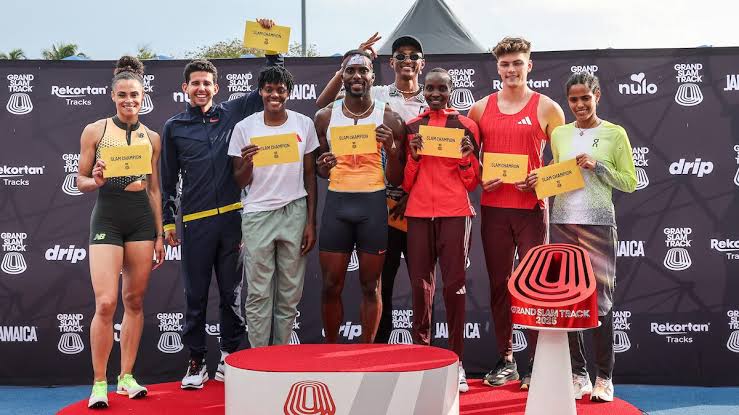
For the past year, Michael Johnson’s Grand Slam Track (GST) has billed itself as the most athlete-first league track and field has ever seen, promising massive prize purses and a bold new vision. But now, after abruptly cancelling its final event in Los Angeles (originally scheduled for June 28–29) and reportedly saving at least US$3 million in the process, some athletes are left asking: where’s my money?
In an interview following the Diamond League meet in Oslo, Norwegian outlet NRK asked several Grand Slam Track athletes whether they had been paid for their appearances and performances. Many had not.
A sparsely filled stands watch on, as Alison Dos Santos competes in the men’s long hurdles event at Grand Slam Track in Kingston, Jamaica. Photo: Kevin Morris
Among them was Brazil’s Alison dos Santos, the 2022 world champion in the 400m hurdles, who said he is still waiting on a US$250,000 cheque from the league. Dos Santos told NRK the Los Angeles cancellation came as a surprise, but added he expects the money to arrive later this year, alongside his contractual fees.
Others were less certain. Kenya’s Olympic 800m champion Emmanuel Wanyonyi, who won the men’s short-distance event at the opening meet in Kingston, Jamaica, said after his win at the Bislett Games that he also hadn’t received his prize money yet. “It might come. Why shouldn’t it come?” he questioned. “They have to pay us. I’ll be patient and wait.”
U.S. rising distance star Nico Young, who won the 3,000m at the Philadelphia Slam and followed it with an American outdoor record in the 5,000m (12:45.27) in Oslo, was more reserved. When asked if he had been paid, he responded, “I don’t know if I’m supposed to say anything about it. We’re working on it.”
Canada’s Charles Philibert-Thiboutot chases down American Cooper Teare in the 5,000m at Grand Slam Track Kingston. Photo: Kevin Morris
Two-time Canadian Olympian Charles Philibert-Thiboutot, who competed as a challenger in the long-distance category in Kingston, said he’s been told his prize money is on the way. Philibert-Thiboutot had high praise for the GST experience. “Grand Slam Track was one of the best experiences I’ve had as a pro,” he told Canadian Running. “I’m sad to see it struggle, because I do think that’s the way athletes should be treated at the highest level.”
One agent who represents multiple GST athletes told Canadian Running that only half of the prize money from Kingston has been paid, and that athletes from the Miami and Philadelphia meets are still waiting. According to the agent, large track and field payouts are typically slow, with athletes waiting six to 12 weeks after a race to receive funds. The inaugural Slam in Kingston happened 11 weeks ago.
Grand Slam Track launched with a budget of around US$30 million for its inaugural season. The funding went toward supporting athlete contracts, event production and a total prize pool of $12.6 million across four meets, with each event distributing $3.15 million.
Wanyonyi Grand Slam Track
Kenyan 800m star Emmanuel Wanyonyi upsets world champion Josh Kerr in the 1,500m at Grand Slam Track Kingston. Photo: Kevin Morris
In an email to NRK, GST spokesperson Callum Squires did not answer all of the outlet’s questions, but offered a brief explanation for the L.A. cancellation. “The financial conditions at the L.A. arena were poor, and the success of our three previous events has led us to make the difficult choice to end the pilot season and set our sights on 2026,” he wrote. “We will announce investors and new partnerships next week.”
It’s not the ending many, including athletes, envisioned for Grand Slam Track’s debut season. Whether the league returns stronger in 2026 may depend on what happens in the coming weeks, and if it follows through on its main promise: paying athletes.
Be the first to comment